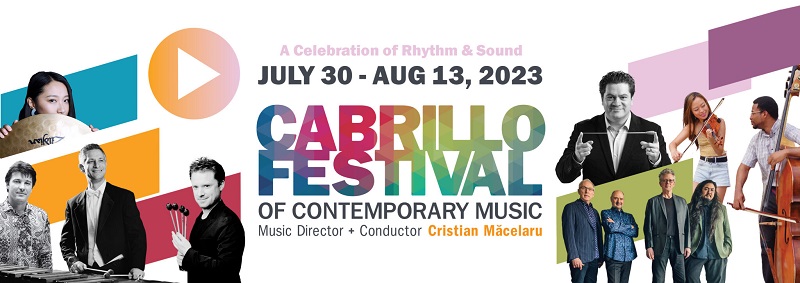
THE FINE LINES OF CLYNE’S SOUNDS
SANTA CRUZ, CA—The shortest was also the most memorable and newest at this year’s Cabrillo Music Festival: The six-minute world-premiere “Wild Geese” by Anna Clyne as the season-finale number by the orchestra. What I admire most about the petite, soft-spoken English composer is her ability to engage the listener again and again—here, at Cabrillo, Aug. 13, heard for the seventh time (and still being streamed). The current radio-play brings her once again to the forefront.
Here she leans in part on timeless past English styles, perceptible for nearly two centuries. She summons up a serene orchestral palette, with solo sonorities popping up here and there. The music is refined and restful, yet with good forward propulsion even in mundane gestures, like the cello section playing alone in unison. It’s a broad-based music, built on traditions of the past, offending no one, yet inevitably ear-drawing.
With the help of audio engineer Jody Elff, the 43-year-old composer co-developed here a marriage of live orchestra with computer-controlled processes without making it sound like electronic music—perhaps a promising future avenue. “Wild Geese” was written in inspiration from a poem by Mary Oliver. Music Director Cristian Macelaru led the unveiling.
Yes, the innovation was of significance, with portends for the future. But with or without, I relish my every contact with Clyne’s fine-lined sounds, though the next new one may be distant, as she is currently in residence with the Helsinki (Finland) Philharmonic. And this is no flash in the pan: In a poll, she was found to rank number eight among the most performed living composers in the world.
The remainder of the KALW rebroadcast (with streaming available through Sept. 24) is featuring four other works from the program, two of them concerto-like. Xavier Foley’s 20-minute “Resurrection of Titan,” also a world premiere, was a reaction to the slow movement of Mahler’s Symphony No. 1 (“Titan”), with its five-note dirge for contrabass, rendered by soloist Foley on said foundation-stone instrument. Foley proved to be an accomplished bass player himself, able to bring it out of the world of growls into the sunlight.
Even longer was Pulitzer-Prize-winning Kevin Puts’ “Concerto for Orchestra,” also inspired by poetry, notable for Puts’ great gift for incorporating fetching melodies.
Dan Caputo’s “Liminal” dealt in hypnotic repetitions and fast runs up and down the scale.
In addition to the tributes for Ellen Primack, so esteemed for her 33 years as festival executive director, there was also attention devoted to the festival’s co-founder in 1963 (!), Robert Hughes, who had passed away last year at 89. The polymath bassoonist, conductor and composer was represented by his “Estampie,” which itself was a tribute to his predecessor composer and sometime mentor Lou Harrison. Estampie, featured by both in revival moods, had been a pre-Renaissance dance form.
So despite the limitations of playing in a hall better serving as a sports arena, the festival continues to thrive, one of the few in America playing contemporary orchestral music exclusively. But perhaps I’m biased, having attended and reviewed the fest with relish almost annually since the second year.
CABRILLO FESTIVAL OF CONTEMPORARY MUSIC, the 2023 finale concert of Aug. 13 on KALW radio 91.7 FM, to be streamed through Sept. 24, www.KALW.org.